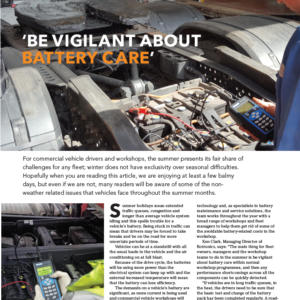Be vigilant about battery care
For commercial vehicle drivers and workshops, the summer presents its fair share of challenges for any fleet; winter does not have exclusivity over seasonal difficulties.
Hopefully when you are reading this article, we are enjoying at least a few balmy days, but even if we are not, many readers will be aware of some of the non-weather related issues that vehicles face throughout the summer months.
Summer holidays mean extended traffic queues, congestion and longer than average vehicle system buidling and this spells trouble for a vehicle’s battery. Being stuck in traffic can mean that drivers may be forced to take breaks and be on the road for more uncertain periods of time.
Vehicles can be at a standstill with all the usual loads in the vehicle and the air conditioning on at full blast. Because of the drive cycle, the batteries will be using more power than the electrical system can keep up with and the external increased temperature will mean that the battery can lose efficiency.
The demands on a vehicle’s battery are significant, as more current is being used and commercial vehicle workshops will have their work cut out to ensure that fleet batteries are in prime condition and fully charged at point of interim servicing to handle the seasonal demands.
Rotronics is the UK partner for CTEK and Midtronics battery management technology and, as specialists in battery maintenance and service solutions, the team works throughout the year with a broad range of workshops and fleet managers to help them get rid of some of the avoidable battery-related costs in the workshop.
Ken Clark, Managing Director of Rotronics, says: “The main thing for fleet owners, managers and the workshop teams to do in the summer is be vigilant about battery care within normal workshop programmes, and then any performance shortcomings across all the components can be quickly detected.
“If vehicles are in long traffic queues, in the heat, the drivers need to be sure that the basic test and charge of the battery pack has been completed regularly. A roadside non-start is expensive and unnecessary and battery-related issues remain at the top of all reasons for roadside breakdowns.”
Rotronics has, for many years, been developing its proven Battery Management Programmes, working with fleet teams to identify the best ways to maintain and identify battery performance-related issues within their fleets.
Ken adds: “In our Battery Management Programme, we have found that those who have installed chargers around several of the service pit areas see the best results by far. They charge their vehicles at every opportunity and the batteries are tested at least every four to six weeks. The improvements in these workshops are impressive and they have managed to cut non-starts by up to 75%.
“This activity should be part of the routine service inspection and takes only a few seconds to save considerable time and money.”
Rotronics is currently developing a battery management portal to help workshops analyse battery performance for their own fleet and it will be able to centrally monitor any number of workshops within a group. The tests you need to perform are:
- Battery balancing
- Individual battery analysis
- Detailed electrical system test, checking both alternator and starter output
- Parasitic drain test on the system
Ken continues: “It seems blindingly obvious to say that workshop teams should only use the most appropriate equipment, but not all testers on the market will identify any parasitic drains that are present. This will cause fatigue over time, not what a driver needs in busy summer traffic. We only use the latest generation test and charge technology from our partners Midtronics and CTEK, who are dedicated to servicing the heavy-duty and commercial vehicle workshop.”
A battery management programme ensures:
- Return-on-investment can be proven and each workshop will have the expertise and knowledge to maximise fault diagnosis, increase productivity and customer service
- A full auditable record is available to monitor and track a fleet’s battery performance
- Batteries are tested pro-actively, at the point of service and routine inspection
- Imbalanced batteries are identified and charged accordingly
- Batteries are maintained to optimum levels
- Defective batteries are identified and replaced before they affect vehicle reliability
This article was published in Commercial Vehicle Workshop (CVW) in July 2017.


